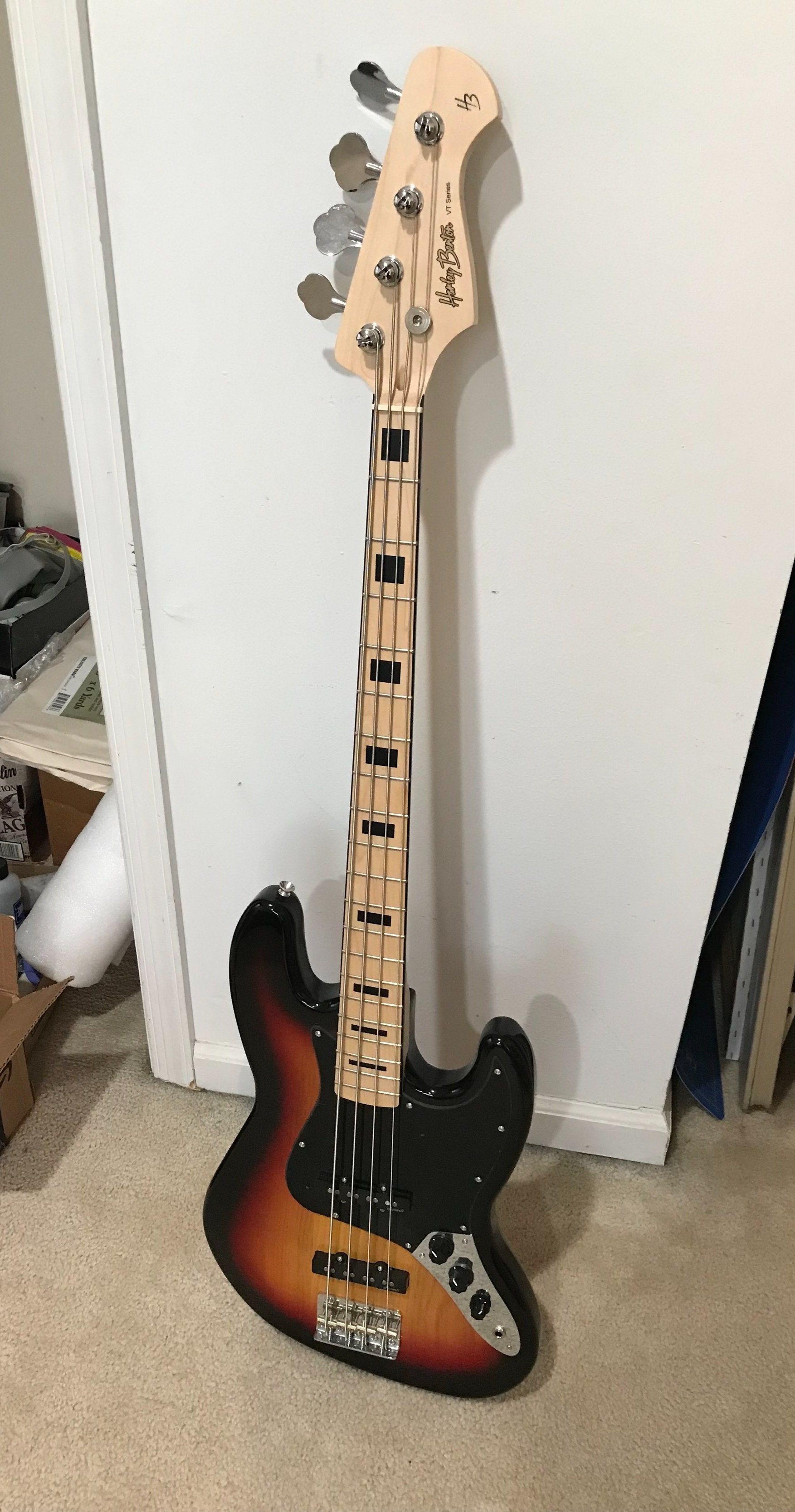Cheap Gear Review: Harley Benton JB-75
I’m going to be completely honest: I’ve played bass in no less than three bands, and I still can’t tell the difference between low-budget and mid-budget bass tones. The human ear simply isn’t designed to pick up bass frequencies at the same level of clarity as those of human speech, and my experience certainly reflects this.
It’s usually the feel of cheap instruments that varies most dramatically, especially at budget price points. Some necks feel dry and inconsistent, with unplayably high actions. Others buzz and intonate poorly. A rare few feel great, making you wonder why you’d ever spend significantly more. So how does this popular budget model fare compared to the rest?
My black sunburst JB
About Harley Benton
Harley Benton is an in-house brand of Thomann music, a large German music equipment distributor. Since Thomann produces products and distributes in large quantities, it has the machinery and overhead to manufacture its own line at an incredibly affordable price point.
HB’s guitars and basses come in a few different affordability levels: extreme budget, very budget, and sort of budget. The lowest price you’ll find for a bass is around 95 USD, which is ridiculous by any measure.
Price and Shipping
I picked up my JB-75 because I recently lost many of my belongings over COVID to the omnipresent mold of the Pacific Northwest. I needed a cheap bass to record with, and the JB-75 was the coolest-looking, best-reviewed, cheapest one I could find.
At the time of my purchase, the product was listed at 180 USD. In total, I paid about 220, thanks to horrendous shipping costs from Germany. Still, the whole package was less than a playable Squier, so I still counted myself fortunate. The shipping process worked without a hiccup, and a gigantic package arrived to scare the hell out of my dog in under a week.
Features
The features are about what you’d expect from a two-pickup budget bass: volume controls, a tone control, and that’s it. Otherwise, there are four strings, usable tuners, and what else is there to say?
I actually like the simplicity of the controls, as the blending of the knobs gives you a smoother range of sounds than a 3-way pickup switch. This comes especially in handy when recording through a thick mix of high or low-end sounds.
Sounds
Like any decent Jazz bass, the JB-75 can sound punchy, flat, or deep, depending on your control settings. This probably isn’t news, though, so I’ll settle your mind by telling you that it sounds great
The internet is a busy place, and I won’t try to outdo better-budgeted content makers by giving you a direct comparison with squiers, fenders, or other comparable, similarly-shaped chunks of wood. here. Instead, I’ll simply give you a few samples of what you might do with the JB-75 and a microphone or Amplitube subscription.
Setup
As with many budget instruments, the worst part of this bass by far is the setup. While the actual feel and sense of quality you get from it is quite high (almost unbelievably high) the quality control seems to be quite luck-based.
The guitar I got was set up reasonably for standard tunings, with annoying buzzing only in a few places. I almost always tune down though, so the buzzing quickly worsened into a real problem. Of course, this isn’t the end of the world, and a truss rod and action adjustment fixed the issue sonically. But I still need a slightly high action to keep things sounding smooth, so I’ll likely head in for a fret leveling soon.
This, of course, is the downside of cheap instruments — you almost always have to put in some work. In some cases, you might end up paying significantly more than you first intended to, just to get things running. Only you can decide whether this risk is worthwhile. In my case, I’m happy with my purchase, and still paid well short of the next cheapest alternative.
One minor additional gripe, and something you’ll hear a lot if you do your work on google: the JB-75 is a heavy instrument. With a strap, it feels like lugging heavy baggage through an airport. If you’re like me, and you plan to pick it up every once and a while to record bass on a laptop, you might be okay with that. If you plan on touring, you might consider buying something lighter — or, perhaps, drilling a few large holes in your JB.
Weighs approximately 1/3 of this dog
So my overall impressions are positive. If I was a touring musician in need of a very good, lightweight bass to play complex compositions on, they might not be so positive.
And that’s about it. If you like what you read, check it out on Thomann’s website. For more metal stuff, keep browsing Metalblog. For a bit of longer-lasting entertainment, check out our books.

